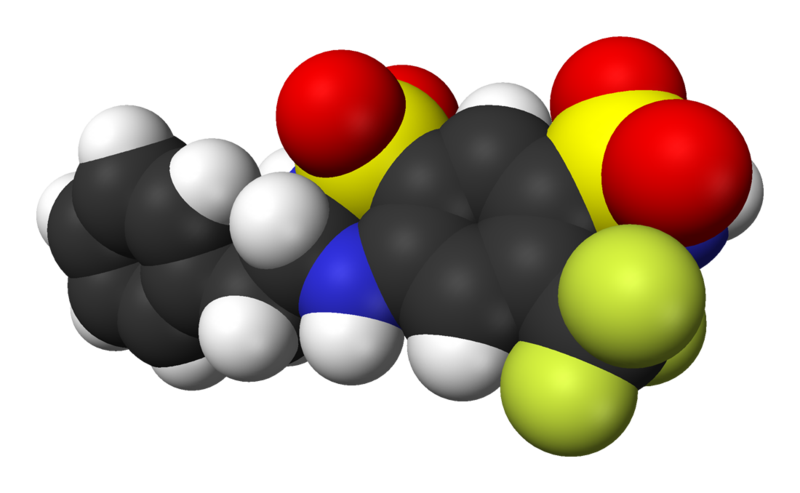Bendroflumethiazide
Jump to navigation
Jump to search
 | |
| Clinical data | |
|---|---|
| AHFS/Drugs.com | Consumer Drug Information |
| Pregnancy category |
|
| Routes of administration | Oral |
| ATC code | |
| Legal status | |
| Legal status |
|
| Pharmacokinetic data | |
| Bioavailability | 100% |
| Protein binding | 96% |
| Metabolism | extensive |
| Elimination half-life | 3-4 hours[2] |
| Identifiers | |
| |
| CAS Number | |
| PubChem CID | |
| DrugBank | |
| ChemSpider | |
| UNII | |
| KEGG | |
| ChEBI | |
| ChEMBL | |
| E number | {{#property:P628}} |
| ECHA InfoCard | {{#property:P2566}}Lua error in Module:EditAtWikidata at line 36: attempt to index field 'wikibase' (a nil value). |
| Chemical and physical data | |
| Formula | C15H14F3N3O4S2 |
| Molar mass | 421.415 g/mol |
| 3D model (JSmol) | |
| |
| |
| (verify) | |
Editor-In-Chief: C. Michael Gibson, M.S., M.D. [1]
Overview
Bendroflumethiazide (INN), formerly bendrofluazide (BAN), trade name Aprinox, is a thiazide diuretic used to treat hypertension.
Bendroflumethiazide is a thiazide diuretic which works by inhibiting sodium reabsorption at the beginning of the distal convoluted tubule (DCT). Water is lost as a result of more sodium reaching the collecting ducts. Bendroflumethiazide has a role in the treatment of mild heart failure although loop diuretics are better for reducing overload. The main use of bendroflumethiazide currently is in hypertension (part of the effect is due to vasodilation).
Common adverse effects:
- postural hypotension
- hyponatraemia, hypokalaemia, hypercalcaemia
- gout
- impaired glucose tolerance
- impotence
Rare adverse effects:
References
- ↑ BNF 45 March 2003
- ↑ Ed. Sean C. Sweetman (ed.). Martindale: The complete drug reference (33 ed.). Pharmaceutical Press.